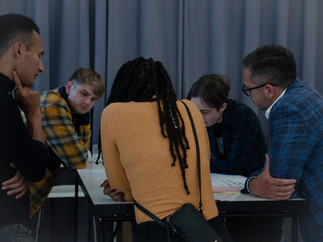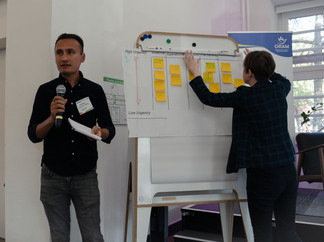On September 30th, ORAM hosted its Stakeholder Consortium in Berlin, bringing together 49 participants from 30 organizations working in various countries across Europe. This dynamic event brought together a diverse range of actors, including international non-governmental organizations (INGOs), local NGOs, LGBTIQ organizations, grassroots collectives, independent consultants, donors, and activists – all working at the intersection of displacement and LGBTIQ inclusion. Participants came from across Central and Eastern Europe (CEE), including Poland, Ukraine, Romania, Hungary, Moldova, Slovakia, Sweden, Germany, and beyond.
Background & Purpose: Building on ORAM's Work in the Region
The event built on the success of ORAM's Roundtable two years ago and ORAM's ongoing work in the region since then. Through our Inclusion Program, we've conducted research, outreach, and stakeholder mapping to identify the critical areas for more support and collaboration. Our previous training and outreach efforts have helped build a network of organizations interested in staying connected, working together, and finding solutions to support LGBTIQ displaced persons.
This event culminated these efforts. The goal was to create a safer, more inclusive space for dialogue to enhance the inclusion of LGBTIQ refugees, where participants could meet, network, and build meaningful collaborations that would extend beyond the Consortium.

Pictured: Attendees at ORAM's Stakeholder Consortium in Berlin on September 30th, 2024.
Keynote Sessions
The Consortium began with a series of keynote sessions addressing some of the most pressing challenges facing LGBTIQ displaced persons in the region today and exploring best practices. The discussions covered ongoing crises such as those at the Polish-Belarusian border, shortages of housing, the Russian invasion of Ukraine, and violence against LGBTIQ people in Afghanistan. The sessions emphasized the importance of recognizing LGBTIQ organizations as experts in their field, fostering equitable partnerships between local LGBTIQ organizations and international actors, and ensuring the inclusion of all LGBTIQ displaced persons, regardless of nationality, in service provision.
The keynote speeches set the stage for the group work sessions and provided essential insights that helped participants engage deeply with the complex issues.
Group Activities
The heart of the event was the collaborative group activities where participants worked together to identify challenges and co-create solutions. Breakout sessions centered around two central themes:
Identifying Collaboration Challenges: Participants first discussed barriers to effective collaboration in supporting LGBTIQ displaced persons. These included limited resources, political hostilities, legal frameworks, and inconsistent funding. Many participants highlighted the need for more sustainable funding, partnerships, and capacity strengthening for activists and platforms to share knowledge across borders.
Crafting Solutions and Mapping Resources: The second session built on these challenges and focused on developing practical, solution-oriented strategies. Ideas such as creating regional resource networks, strengthening the capacity of local actors, and increasing advocacy for legal protections were some of the key outcomes. Each group mapped out how these solutions could be implemented and how resources could be better leveraged across the region.
The group activities were instrumental in fostering meaningful networking and collaboration opportunities. Many participants noted that this was the first time they had connected with so many other actors in the field, which was a key takeaway from the day.
Pictured: Participants at ORAM's Stakeholder Consortium during the collaborative group activities.
Key Outcomes, Feedback, & Reflections
An essential outcome of the event was the importance and realization of regional and broader collaboration for organizations and collectives supporting LGBTIQ displaced persons. Through these structured activities, participants shared their expertise and laid the groundwork for future partnerships. Many emphasized the importance of cross-border collaboration, noting that the challenges faced by LGBTIQ displaced persons do not abide by national borders and require a coordinated, collective effort.
In their feedback, several participants noted that they appreciated the opportunity to meet new actors in the field and that the group activities allowed for in-depth discussions on practical, collaborative solutions. One participant noted, "The event provided a safe space for honest dialogue and brainstorming. We left with new connections and concrete ideas on strengthening our regional efforts." Another emphasized the importance of networking, saying, "It was incredibly valuable to meet like-minded actors, exchange ideas, and identify future opportunities for collaboration."
The feedback we received reflected the overall positive impact of the event. Participants rated the group activities highly, most rating them as "excellent" or "good" in identifying challenges and solutions. There was a consensus that the event provided a meaningful opportunity for dialogue, with over 80% of participants giving this aspect the highest rating. In addition, most participants expressed interest in participating in similar events in the future, underscoring the importance of maintaining this collaborative momentum.
One recurring point in the feedback was that the event created a much-needed space for organizations to connect and share ideas, especially those who might not otherwise have the opportunity to meet in person. This reflects one of the main goals of the event—to foster collaboration and strengthen networks within the region.
Conclusion
ORAM's Stakeholder Consortium 2024 was a successful event, not only in terms of the knowledge shared but also in terms of the connections made and the spirit of collaboration fostered. As we move forward, ORAM is committed to continuing its work in the region, using the insights and partnerships from this event to drive further progress for LGBTIQ displaced persons.
We will be sharing more detailed information about the outcomes and collaborative initiatives emerging from this consortium in the near future. We encourage everyone to stay updated on ORAM's work as we continue to foster partnerships and support LGBTIQ displaced persons throughout the region. We thank all the participants for their engagement and look forward to deepening our collaborative efforts in the months to come.
Aras (he/they) is a Capacity Strengthening Specialist at ORAM based in Berlin, Germany.









Comments